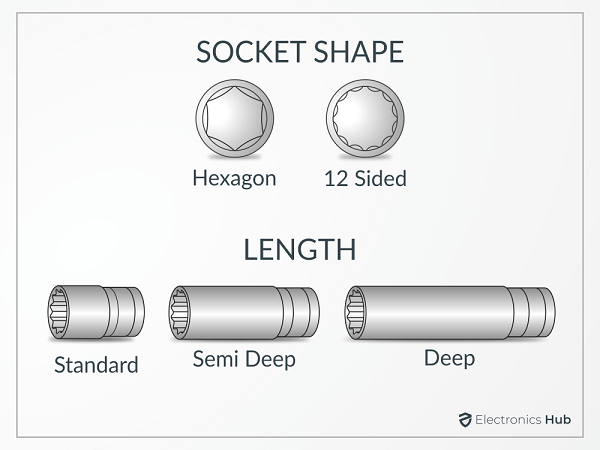Below, you’ll find the necessary information about sockets, their types, and sizes. You’ll also find a detailed chart for easy conversion. So, let’s begin.
Most Common Drive Sizes
You can think of a drive socket as the hole (square) for attaching the socket to a turning tool like a wrench or a ratchet. There are three commonly found standard sizes according to what you need it for. Here are the common sizes:
1/2″ Drives: Such drives are mostly used for heavy jobs where the nuts are massive and need more force or torque. ½” drives are mostly used in 19mm socket sizes. You can use these when driving lag bolts into the walls for mounting your LED TV. 3/8″ Drives: Such drives are more versatile. It’s because you can use these drives to cover sockets and areas for different jobs. It is used both at homes and workshops. 1/4″ Drives: When it comes to low torque jobs, you can go for 1/4″ drives. You can use such drives for small sockets with a maximum size of 14mm. It’s used for precision or interior jobs.
Types of Sockets
There are different sockets suited for different jobs. If you’re in the mechanical field, you’ll find the below information useful. Here are some common types of sockets:
Impact Sockets: Most of the time, people prefer hand tools. It’s because they are old school and have a sturdy build. However, most socket types don’t attach with such tools. And this is where impact sockets come into the picture. Impact sockets are specially designed to fit in such tools. For example, let’s suppose you’re working with a pneumatic or electric wrench. Now, for such tools, you need sockets that are sturdy and can withstand high torques. And impact sockets get the job done here as they are sturdier and more robust than conventional sockets. Point Sockets: Next on our list are the point sockets. Such sockets, especially the 12-point one, are very easy to fit and use. You can easily slip this socket over the tool in any of the available 12 positions. So, even if you’re a newbie, you can easily use it, as there won’t be an alignment problem. The 12-point sockets are usually meant for light household tasks. However, there’s another category to this socket known as a 6-point socket. The 6-point socket is used for heavy jobs that require the application of heavy or substantial torque. In such cases, the 6-point sockets are less likely to slip or move. They are considered more durable and sturdier than the inner walls. So, if you need a socket for lightweight jobs, go for the 12-point socket. Otherwise, go for a 6-point socket.
Shallow vs. Deep Sockets
The shallow socket is the other name for a normal socket. In some cases, it might not touch the nut before the bolt hits the end of the socket, which makes the job hard and sometimes not doable. In such cases, mechanics use deep sockets. Usually, measuring one inch in length, you can use deep sockets in inaccessible places. You can do this only if your driver has an extension.
Metric Socket Sizes Chart
Here are the metric socket sizes: –
SAE Socket Sizes Chart
Let’s learn about the SAE socket sizes: –
SAE to Metric Conversion Chart
Sometimes when you have a wrench in the metric units and a nut in Imperial units, you would not know whether it’ll fit or not. In such cases, you need to know how to correctly convert one unit into another. And the below chart will help you easily convert the dimensions from SAE to Metric or vice versa.
Final Words
Being a mechanic is a tough job. And if you’re dealing with a socket set or socket organizer, the job becomes even harder. There are different sizes, types, and even measurement units for sockets. And without adequate information, everything could sound gibberish. However, the above information is enough to enlighten you. We have discussed the sizes of drives and types of sockets. You can check the size of sockets in the metric as well as in the SAE system. Also, you can find a conversion chart for converting the sizes into the desired unit type. This way, you can sort the sockets the way you want and save some time while doing the job. Video:
Comment * Name * Email * Website
Δ






![]()